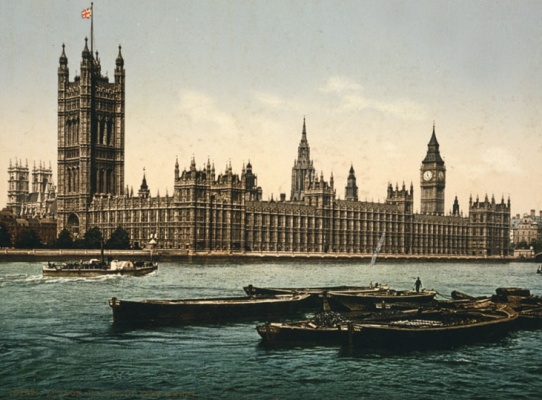

Admiral Kemp, the commander of the British naval forces in Arkhangelsk, invited myself and my wife to move in on his yacht, which bears his own pennant, in the expectation that the passenger ship Umtali will soon depart for England.
The British authorities in Arkhangelsk have been very kind to me.
In one of the Foot Guards regiments people refused to remove the insignia of Nicholas II from their epaulets. For both regiments, I have instructed that those who did not wish to take the oath were allowed to not participate in the ceremony; those who wanted to leave the emperor’s insignia on their epaulets, received permission to do so.
Having found out that I was to present a report to the Emperor on the following day, Rodzianko called on me in my hotel. Our conversation stretched deep into the night and finished at 2am. Wishing him a good night, I promised once again to try and make the Tsar see sense and issue the reforms of the so-called “Progressive Bloc”.
The “Progressive Bloc” was the name given to an assembly of party leaders and influential statesmen from the State Duma and State Council. Given the state of the country, their demands in early 1917 were very modest. The most important of these demands was that the Tsar would issue a decree granting full authority to Prime Minister Alexander Trepov to select cabinet ministers for the government. After the selection, the cabinet was to be accountable not to the Duma but to the Tsar personally.
Rumours have been circulating the world over to the effect that the Empress is a German sympathiser, with relevant evidence adduced. These rumours, which resist refutation, will undoubtedly find their way into the field army, and the consequences of their propagation may prove highly deleterious. It has been claimed, for example, that during one of my reports to His Majesty, the Empress entered his office, upon which I discontinued my report. His Highness, so it is alleged, proceeded to tell me that he had no secrets from the Empress, to which I am supposed to have responded that, on the other hand, did have such secrets. But, far from bespeaking the existence of any “fire”, as per the famous proverb, this tittle-tattle is “smoke-free”, too; during my time as Chief-of-Staff, the Empress has not been present at a single one of my reports to the Tsar, conversations at table excepted.
In his speech at the opening of the conference, General Gurko stated that Russia had mobilized fourteen million men, had lost two millions in killed and wounded, as well as two million prisoners, and had at present seven and a half millions under arms and two and a half millions in her reserve depots. He did not hold out any hope of her army being able to take an offensive on a large scale till the new divisions, about to be formed, had been finally constituted, trained and equipped with the necessary guns, rifles and munitions. All that it could do meanwhile was to hold the enemy by actions of secondary importance. The putcome of the conference was a series of recommendations with regard to the war material and credits which it was proposed that the Allied Governments should place at Russia's disposal.
Having been postponed several times, the Inter-Allied Conference was scheduled for late January 1917. The choice of the Russian capital as its venue represented a fresh attempt to confirm the commonality of the interests of all the Entente Cordiale countries. There was every reason to believe that the summer campaign of 1917 would consolidate the unity of their efforts both in theory and in practice.
Conference delegates travelled to Russia in secret due to the risk of a German U-boat attack.